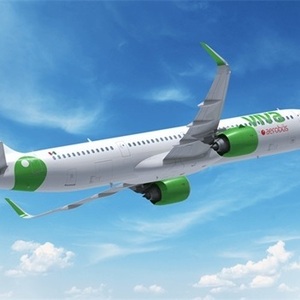Neste, Viva Aerobus sign purchase agreement for 1M liters of SAF

April 25, 2023
BY Neste Corp.
Neste and Viva Aerobus, the Mexican ultra low-cost carrier, have signed a new purchase agreement for one million liters (264,000 gallons) of Neste MY Sustainable Aviation Fuel. The sustainable aviation fuel (SAF) supplied to Viva Aerobus will be blended with conventional jet fuel and used to power the airline’s flights from Los Angeles International Airport to Guadalajara, Mexico City and Monterrey in Mexico.
Last year, on June 15, Viva Aerobus completed its first flight powered by Neste’s SAF from Los Angeles to Guadalajara, and the current agreement is the next step in fulfilling the airline’s mission of further reducing its carbon emissions. SAF-powered flights will start to take off in the second half of 2023 with each flight using a fuel blend with about 35 percent of Neste MY SAF. The total volume of SAF purchased will help Viva Aerobus reduce greenhouse gas emissions by approximately 2,415 tons of CO2e*, equivalent to the emissions of 537 passenger cars in the U.S. in a year**.
“We embrace the goal to reduce our carbon footprint, a goal which requires an extensive commitment. We are proud to increase the use of SAF, partnering with Neste, and we will also continue to take further steps in adhering to best practices in sustainability such as optimizing our fuel efficiency. We deeply thank Neste for supporting us on our journey towards becoming a more eco-friendly carrier,” said Juan Carlos Zuazua, CEO of Viva Aerobus.
Advertisement
Advertisement
“We are thrilled to team up with Viva Aerobus, a fast-growing airline, and support their commitment to minimizing the carbon footprint of their flights with our Neste MY Sustainable Aviation Fuel. Los Angeles International Airport is an important hub for Viva Aerobus travelers to fly between the U.S. and Mexico, and this partnership will make their trips more sustainable, building on Neste’s capabilities to supply SAF to airlines at one of the busiest airports in the US and the world,” said Michael Sargeant, Vice President Americas from the Renewable Aviation business unit at Neste.
In addition to purchasing Neste’s SAF, Viva's recent efforts to contribute to a more sustainable Mexican air industry include Viva being the airline with the youngest aircraft fleet in Mexico equipped with fuel-efficient technology, implementing the first program in the Mexico aimed to separate and recycle on-board waste, and the launching of its voluntary carbon offset program.
Sustainable Aviation Fuel
SAF is a renewable aviation fuel providing a more sustainable alternative to conventional, fossil based jet fuel. It is widely recognized as a key lever to achieve aviation’s emission reduction goals. Using Neste MY Sustainable Aviation Fuel™ reduces greenhouse gas emissions by up to 80 percent*** over the fuel’s life cycle, compared to using conventional jet fuel. Neste’s SAF is made from sustainably sourced, 100 percent renewable waste and residue raw materials, such as used cooking oil and animal fat waste.
Advertisement
Advertisement
*) Calculated based on fossil jet fuel life cycle emissions of 3.9 tons CO2e per metric ton jet fuel and a reduction of GHG emissions of up to 80 percent by replacing fossil fuel with neat SAF.
**) See here: https://www.epa.gov/energy/greenhouse-gas-equivalencies-calculator
***) When used in neat form (i.e. unblended) and calculated with established life cycle assessment (LCA) methodologies, such as CORSIA methodology
Related Stories
Broco Energy on July 17 announced a new partnership with the Massachusetts Port Authority (Massport) to deliver and transition Massport's fuel tanks to renewable diesel across its various facilities.
Shell Aviation, Accenture, and Amex GBT on July 10 announced Avelia is in the process of evolving to an industry solution with independent data hosting and a multi-supplier model helping users access the GHG benefits of SAF.
The U.S EPA on July 17 released data showing more than 1.9 billion RINs were generated under the RFS during June, down 11% when compared to the same month of last year. Total RIN generation for the first half of 2025 reached 11.17 billion.
The U.S. EPA on July 17 published updated small refinery exemption (SRE) data, reporting that six new SRE petitions have been filed under the RFS during the past month. A total of 195 SRE petitions are now pending.
European biodiesel producer Greenergy on July 10 confirmed plans to shut down its biodiesel plant in Immingham, Lincolnshire, U.K. The company temporarily suspended operations at the facility earlier this year.
Upcoming Events










